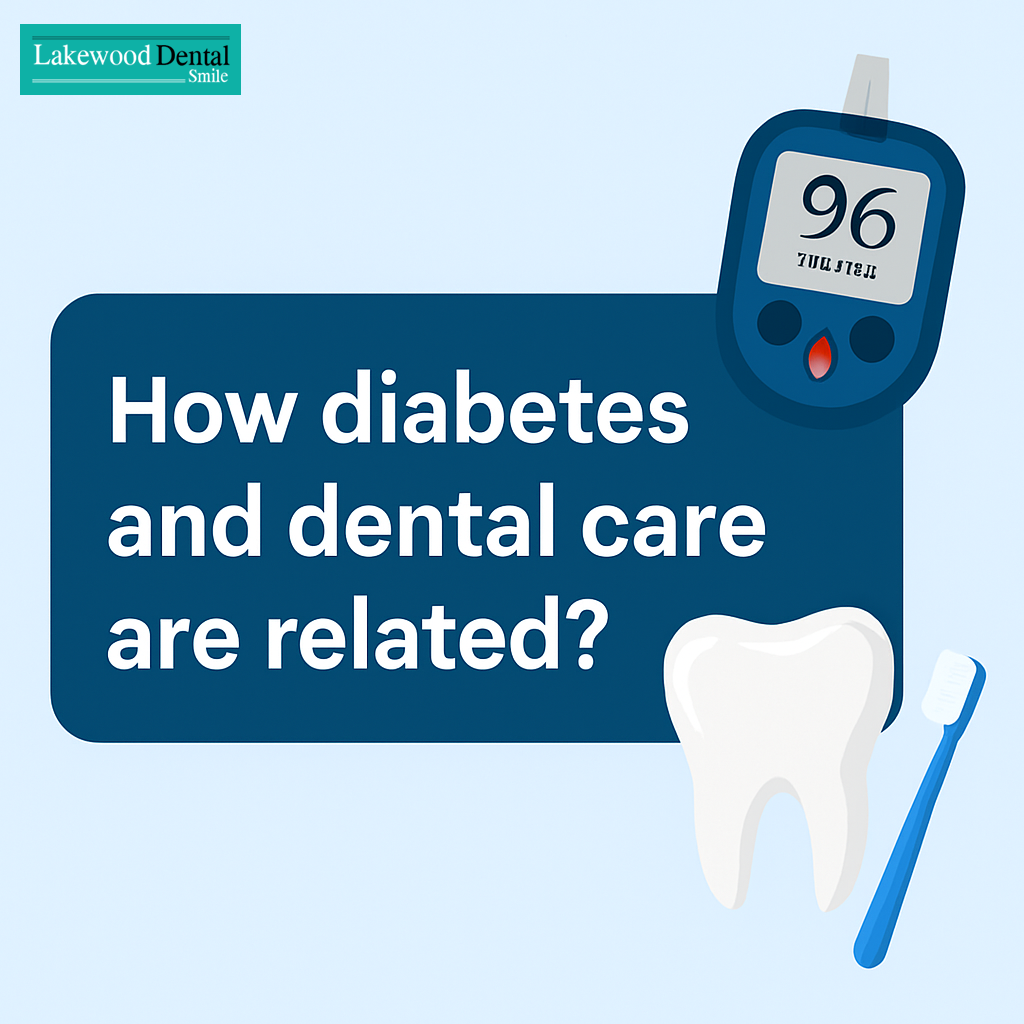Diabetes and dental care are more connected than many realize. Having diabetes increases the risk of complications that affect multiple parts of the body — including your teeth and gums. People with uncontrolled blood sugar levels are more likely to develop gum disease, dry mouth, and other oral health problems. Maintaining proper diabetes and dental care helps prevent complications, improves overall health, and ensures your teeth and gums remain strong throughout your life.

Diabetes reduces blood flow to the gums, making them weaker and more prone to infections. It can also affect the bones supporting your teeth, leading to mobility or even tooth loss. Additionally, high blood sugar levels often cause dry mouth, which increases bacterial buildup and worsens gum disease.
Just as food choices affect blood sugar, they also influence your dental care routine. Maintaining a balanced diet, practicing proper oral hygiene, and visiting your dentist regularly are essential steps for preventing serious dental complications.
How Does Diabetes Cause Dental Problems?
Diabetes can cause dry mouth, making individuals more prone to bad breath (halitosis). When the mouth lacks moisture, it becomes an easy environment for bacteria to grow, leading to mouth ulcers, infections, and cavities. People with diabetes should pay extra attention to brushing, flossing, and staying hydrated to reduce these risks effectively.
Furthermore, diabetes weakens your body’s ability to fight bacteria in the mouth. This can result in gum inflammation (gingivitis), which, if left untreated, may progress to periodontitis — a severe form of gum disease that damages the soft tissue and bone. Poor gum health can also make blood sugar levels harder to control, creating a cycle that worsens both conditions.
Dental Problems Commonly Faced by Diabetics
People with diabetes are at higher risk of several oral health problems, including:
- Periodontal Disease: An advanced gum infection that can damage soft tissue and bone.
- Dry Mouth (Xerostomia): Caused by high blood sugar or certain medications, increasing cavity risk.
- Bad Breath (Halitosis): Due to bacterial buildup and poor blood sugar control.
Early detection and consistent diabetes and dental care can prevent these issues from worsening and improve overall oral health outcomes.
The Impact of Diabetes on Oral Health
A dry mouth caused by diabetes increases discomfort and makes cavities more likely. When your body can’t combat oral bacteria effectively, gum inflammation becomes common. Over time, this can lead to tooth loss and make blood sugar management more difficult. Managing both conditions together is key to maintaining long-term oral and overall health.
5 Powerful Dental Care Tips for People with Diabetes
1. Manage Diabetes Consistently
Keep blood sugar levels within the recommended range. Good diabetes control reduces your risk of gum disease, dry mouth, and tooth decay.
2. Brush Twice a Day
Use a soft-bristled or electric toothbrush with fluoride toothpaste. Brush after meals and replace your toothbrush every three months.
3. Schedule Regular Dental Visits
Visit your dentist at least twice a year for cleanings, X-rays, and exams. Always inform your dentist about your diabetes so they can tailor your care.
4. Watch for Early Signs of Gum Disease
Redness, bleeding gums, mouth pain, or loose teeth may be warning signs. Report these to your dentist immediately for early treatment.
5. Avoid Smoking
Smoking worsens gum disease and delays healing. Quitting can significantly improve both your diabetes and dental health outcomes.
Professional Dental Care in Dearborn
At Lakewood Dental Smile in Dearborn, Michigan, we specialize in helping patients manage the connection between diabetes and dental care. From preventive cleanings to advanced gum treatments, our goal is to protect your smile and overall health.
📞 Schedule an appointment for expert advice and personalized care tailored to your needs.


